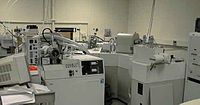Mass-analyzed ion kinetic energy spectrometry

Imagine you're trying to find out what kind of toys are hiding in a big toy box. You can stick your hand inside and pick out one toy at a time, or you can shake the box and listen to the sounds each toy makes.
Mass-analyzed ion kinetic energy spectrometry is kind of like shaking the toy box to figure out what toys are inside. Except instead of toys, we're trying to figure out what molecules are in a sample. And instead of shaking the box, we're sending electrically charged particles called ions through the sample to see what kind of molecules they interact with.
We start by taking a tiny sample of the thing we want to analyze, whether it's a gas, liquid, or solid. Then we vaporize the sample – that is, we turn it into a gas – and shoot a laser or other energy source at it to create ions. These ions are like little electrically charged particles that we can manipulate and measure.
Next, we use an instrument called a mass analyzer to sort the ions by their mass-to-charge ratio. This means we're separating them based on how heavy they are compared to how many electrical charges they have. Think of it like sorting a bunch of marbles based on their size and color. The mass analyzer uses magnets and electric fields to steer the ions in different directions, allowing us to detect which ones have a specific mass-to-charge ratio.
Finally, we measure how fast the ions are moving – their kinetic energy – when they come out of the mass analyzer. This tells us not just what kind of molecules are in the sample, but also how many there are and how they're interacting with each other. It's like getting a much more detailed look at the toys in the box – not just what they are, but also how they're bouncing around and moving.
Mass-analyzed ion kinetic energy spectrometry is a powerful tool for studying all kinds of substances, from simple molecules to complex proteins and beyond. By breaking them down into tiny ions and analyzing how they move and interact, we can learn a lot about what makes them tick.
Mass-analyzed ion kinetic energy spectrometry is kind of like shaking the toy box to figure out what toys are inside. Except instead of toys, we're trying to figure out what molecules are in a sample. And instead of shaking the box, we're sending electrically charged particles called ions through the sample to see what kind of molecules they interact with.
We start by taking a tiny sample of the thing we want to analyze, whether it's a gas, liquid, or solid. Then we vaporize the sample – that is, we turn it into a gas – and shoot a laser or other energy source at it to create ions. These ions are like little electrically charged particles that we can manipulate and measure.
Next, we use an instrument called a mass analyzer to sort the ions by their mass-to-charge ratio. This means we're separating them based on how heavy they are compared to how many electrical charges they have. Think of it like sorting a bunch of marbles based on their size and color. The mass analyzer uses magnets and electric fields to steer the ions in different directions, allowing us to detect which ones have a specific mass-to-charge ratio.
Finally, we measure how fast the ions are moving – their kinetic energy – when they come out of the mass analyzer. This tells us not just what kind of molecules are in the sample, but also how many there are and how they're interacting with each other. It's like getting a much more detailed look at the toys in the box – not just what they are, but also how they're bouncing around and moving.
Mass-analyzed ion kinetic energy spectrometry is a powerful tool for studying all kinds of substances, from simple molecules to complex proteins and beyond. By breaking them down into tiny ions and analyzing how they move and interact, we can learn a lot about what makes them tick.
Related topics others have asked about:
